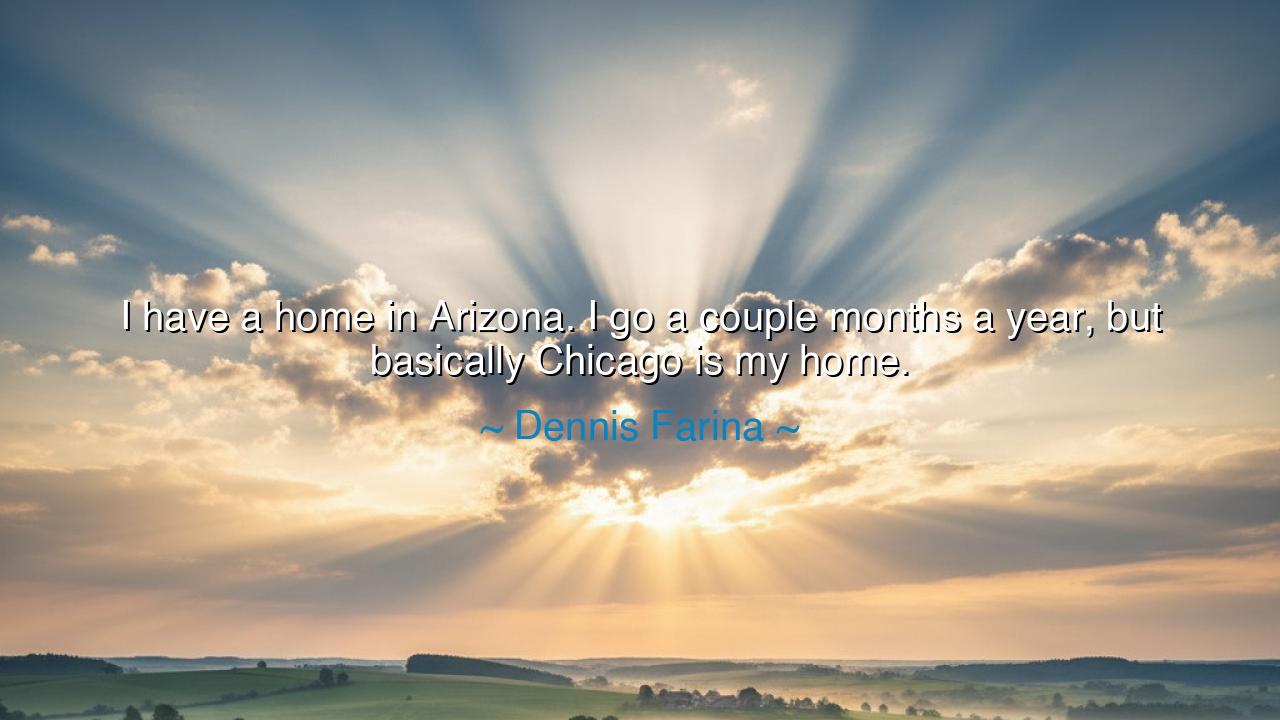
I have a home in Arizona. I go a couple months a year, but
I have a home in Arizona. I go a couple months a year, but basically Chicago is my home.






In the ledger of belonging, a simple oath is written twice and underlined: “I have a home in Arizona. I go a couple months a year, but basically Chicago is my home.” Hear the rhythm—season and center, pilgrimage and root. The speaker, Dennis Farina, lays out a map of the heart in plain speech: there may be many roofs, but only one roof names you. The sentence honors comfort without confusing it for covenant. Arizona offers ease, space, and light; Chicago offers identity, memory, and the old handclasp of streets that know your stride.
To say “I have a home in Arizona” is to bless a refuge—winter’s reprieve, a place for rest and wide sky. Yet the second clause turns the compass back to true north: “but basically Chicago is my home.” The ancients would nod: a person’s first city is the grammar of their soul. It is where your ear learned weather, where your feet learned pace, where your name first echoed from brick and window. A second dwelling can soothe the body; the first keeps the story. So the line draws a sacred distinction between a home you inhabit and a home that inhabits you.
Farina’s life lends this sentence its marrow. Before the cameras, there were squad cars; before the sets, there were precinct houses. His craft grew out of Chicago’s streets—their blunt talk, their humor tough as hickory, their stubborn heartbeat in lake wind. The declaration is not geography; it is gratitude. Even the desert’s blue distances—dear as they are—cannot rename the river that runs through a man’s speech. Thus Arizona becomes a good guest room; Chicago remains the family table.
Consider a story, told as elders would. A mason named Carlo spent summers building in a northern city and winters with his daughter beneath a southern sun. He loved the citrus trees and the hush of warm evenings, yet when he dreamed, he always walked a block of brick rowhouses beside a gray lake. One day his granddaughter asked which was “really” home. Carlo smiled and tapped his chest. “The place that taught my heart its beat,” he said. “The other place keeps that beat steady.” So he kept two addresses and one allegiance—just as Farina’s line keeps two shelters and one center.
History echoes this wisdom. Odysseus sat on splendid shores where goddesses promised him ease without end; still he chose the salt and hazard that would bring him back to Ithaca. Not because Ithaca was gentler—it was not—but because it was his measure. Home is not merely the softest bed; it is the landscape where one’s vows make sense. So too here: the desert’s comfort cannot replace the city that fitted Farina’s gait and gave his voice its iron.
The lesson is plain enough to carve above a doorway: distinguish between respite and root. Keep your sanctuaries—your Arizona—and honor them as gifts; but never forget the soil that grew you—your Chicago—which asks of you memory, service, and return. Mistake the guest room for the hearth, and you will become a tourist in your own life. Honor the hearth, and the guest room becomes brighter, because it serves a center.
Let your actions follow steady as a train. First, name your center out loud—what place, people, or practice is “basically my home.” Second, visit your respite without guilt, but return with intention: carry back stories, not just souvenirs. Third, invest where your name fits the stones—mentor a neighbor’s child, tip the diner waitress who knows your coffee, keep faith with the small businesses that kept faith with you. Fourth, keep a ritual of return—a certain corner to stand on, a certain skyline to greet—so your heart remembers its cadence. Do this, and you may dwell in many houses yet live from one: rested by Arizona, anchored by Chicago, and whole.






AAdministratorAdministrator
Welcome, honored guests. Please leave a comment, we will respond soon